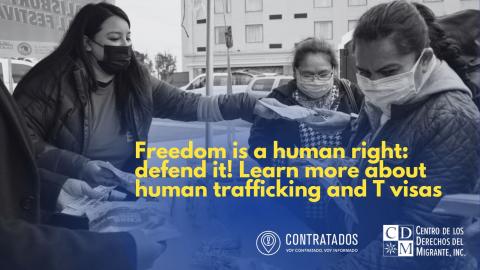December 6, 2024
Freedom is a human right: defend it! Learn more about human trafficking and T visas

People who come to the United States for work are at an increased risk of exploitation, which can ultimately lead to human trafficking. In these situations, a worker’s autonomy is taken away and they are forced to work against their will. Even after escaping, a person can be at risk of retaliation upon returning to their home country. In an attempt to address this problem, the United States has created a visa program called a T visa.
What is a T visa?
This visa is reserved for people who have been victims of a severe form of trafficking and who are willing to report their trafficking and participate in an investigation, or prosecution, if needed. The visa provides immigration status and a path to citizenship to noncitizen trafficking victims: it allows them to remain in the US to assist in the investigation and to prevent others from being trafficked.
But what is human trafficking?
Human trafficking refers to a process in which people are coerced by force or threat of force, and sometimes deception or false promises, and then compelled to perform forced labor or a commercial sex act. Under US federal law, there are two types of trafficking.
The first is sex trafficking, where a person is forced to perform a commercial sex act against their will, or the person is under the age of 18.
The other kind of trafficking is labor trafficking, where a person is forced to do work against their will.
The first requirement is the applicant must be a victim of severe trafficking.
The second requirement is the person has to be currently in the US on account of trafficking, meaning their last entry to the United States was because of the trafficking.
The person cooperates with law enforcement in the investigation and/or prosecution of the trafficking. There are some exceptions for underage victims, or if cooperation could cause them severe psychological or physical harm.
The fourth requirement is that the person would suffer hardship and unusual harm upon removal from the US. For example, this could refer to the threat of retaliation from the trafficker in the person’s home country, or a lack of resources for trafficking survivors in the person’s home country.
Finally, the applicant has to be admissible to the US under all other grounds or be able to obtain a waiver. In order to know whether you are admissible to the US or if you can obtain a waiver, you should analyze your individual case with a lawyer with immigration law expertise.
Keep in mind that before you submit any immigration petition to the United States government, it is very important that you assess your individual case with a lawyer with immigration law expertise.
If you decide to request a T visa, you can do so by submitting forms and evidence that you qualify for a T visa to a federal immigration agency in the U.S. Which forms and evidence to include depends on each person’s specific case. Because of this, it is very important that you consult with a lawyer about your case before applying for a T visa.
Generally, people who apply for a T visa include a personal statement describing their experience as a human trafficking victim and why they believe they are eligible for this visa, along with supporting evidence related to the person’s trafficking experience and other requirements, and any required forms. A person who applies for a T visa can also apply for visas for certain family members. For example, if your parents, single siblings under 18, or children are experiencing severe threats of immediate retaliation in your home country, you can request visas for them through this process. If your family members are not in immediate danger, you can still apply for visas for your spouse and single children under 21; and if you are under 21, for your parents and single siblings under 18 as well.
While the intent of the T visa is positive, it has limits that ultimately affect the number of people who apply. For example:
The process can take over a year and about 21% of applications are rejected. This is deeply disheartening, as in the United States, it is estimated that 14,500-17,500 people are trafficked into the United States each year, not including those trafficked within US borders. This estimate does not match the cap of 5,000 T visas allocated per year.
Even more concerning is the fact that this cap has never been reached. An average of just over 600 per year has been approved between 2008 and 2022. Overall, strict requirements must be met to qualify for a T visa, and many people choose not to apply out of fear it may be rejected and of retaliation from traffickers.
The T visa provides an opportunity for people who have experienced trafficking to obtain citizenship in the US as a means of protecting their lives after severe psychological and physical trauma. Although the system is not perfect, it is a promising start for the future of many workers.
If you think you may qualify for a T visa, consult with a lawyer with immigration law experience about your particular case. At Centro de los Derechos del Migrante, Inc., we can help connect you to a lawyer with immigration law expertise who can help you analyze your case.
Do you have questions about your rights in the workplace, or do you want more information about T visas? Contact Centro de los Derechos del Migrante, Inc. for legal or general advice by calling Monday through Friday between 9am and 5pm (Mexico City time).
From Mexico at (800) 590-1773,
From the United States at 1-(855)-234-9699, or
From anywhere else at 55 52 11 9397.
All of our services are free and confidential.
We are on Youtube and Facebook: visit us and join the fight.
